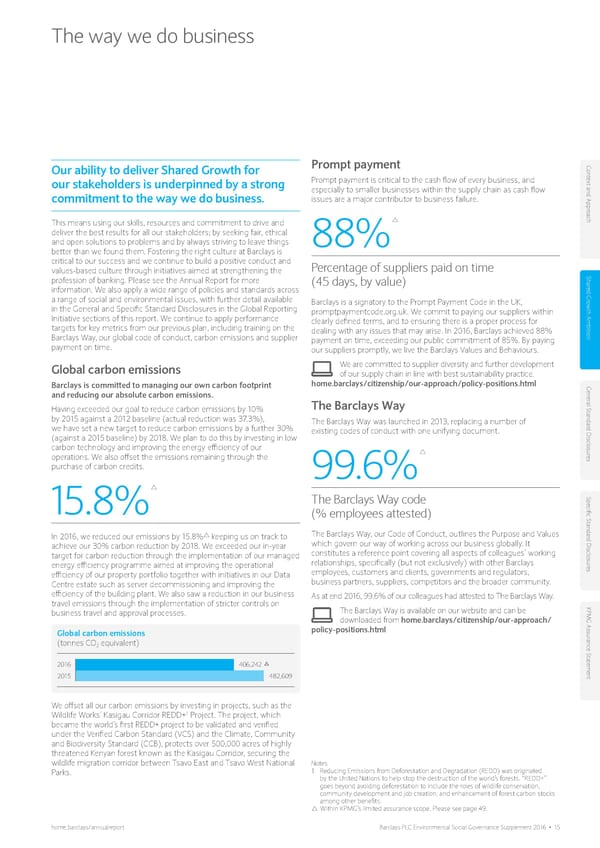The way we do business Our ability to deliver Shared Growth for Prompt payment Con t e our stakeholders is underpinned by a strong Prompt payment is critical to the cash flow of every business, and xt and Appr especially to smaller businesses within the supply chain as cash flow commitment to the way we do business. issues are a major contributor to business failure. o This means using our skills, resources and commitment to drive and ach deliver the best results for all our stakeholders; by seeking fair, ethical and open solutions to problems and by always striving to leave things 88% better than we found them. Fostering the right culture at Barclays is critical to our success and we continue to build a positive conduct and Percentage of suppliers paid on time values-based culture through initiatives aimed at strengthening the profession of banking. Please see the Annual Report for more (45 days, by value) Shar information. We also apply a wide range of policies and standards across ed Gr a range of social and environmental issues, with further detail available o in the General and Specific Standard Disclosures in the Global Reporting Barclays is a signatory to the Prompt Payment Code in the UK, wth Ambition Initiative sections of this report. We continue to apply performance promptpaymentcode.org.uk. We commit to paying our suppliers within targets for key metrics from our previous plan, including training on the clearly defined terms, and to ensuring there is a proper process for Barclays Way, our global code of conduct, carbon emissions and supplier dealing with any issues that may arise. In 2016, Barclays achieved 88% payment on time. payment on time, exceeding our public commitment of 85%. By paying our suppliers promptly, we live the Barclays Values and Behaviours. Global carbon emissions We are committed to supplier diversity and further development of our supply chain in line with best sustainability practice. Barclays is committed to managing our own carbon footprint home.barclays/citizenship/our-approach/policy-positions.html Gener and reducing our absolute carbon emissions. The Barclays Way al S Having exceeded our goal to reduce carbon emissions by 10% tandar by 2015 against a 2012 baseline (actual reduction was 37.3%), The Barclays Way was launched in 2013, replacing a number of we have set a new target to reduce carbon emissions by a further 30% existing codes of conduct with one unifying document. d Disclosur (against a 2015 baseline) by 2018. We plan to do this by investing in low carbon technology and improving the energy efficiency of our operations. We also offset the emissions remaining through the es purchase of carbon credits. 99.6% 15 . 8 % The Barclays Way code Specific S (% employees attested) tandar The Barclays Way, our Code of Conduct, outlines the Purpose and Values In 2016, we reduced our emissions by 15.8% keeping us on track to which govern our way of working across our business globally. It d Disclosur achieve our 30% carbon reduction by 2018. We exceeded our in-year constitutes a reference point covering all aspects of colleagues’ working target for carbon reduction through the implementation of our managed relationships, specifically (but not exclusively) with other Barclays energy efficiency programme aimed at improving the operational employees, customers and clients, governments and regulators, es efficiency of our property portfolio together with initiatives in our Data business partners, suppliers, competitors and the broader community. Centre estate such as server decommissioning and improving the efficiency of the building plant. We also saw a reduction in our business As at end 2016, 99.6% of our colleagues had attested to The Barclays Way. travel emissions through the implementation of stricter controls on The Barclays Way is available on our website and can be KP business travel and approval processes. downloaded from home.barclays/citizenship/our-approach/ MG Assur Global carbon emissions policy-positions.html (tonnes CO2 equivalent) ance S ta t 2016 406,242 emen 2015 482,609 t We offset all our carbon emissions by investing in projects, such as the 1 Wildlife Works’ Kasigau Corridor REDD+ Project. The project, which became the world’s first REDD+ project to be validated and verified under the Verified Carbon Standard (VCS) and the Climate, Community and Biodiversity Standard (CCB), protects over 500,000 acres of highly threatened Kenyan forest known as the Kasigau Corridor, securing the wildlife migration corridor between Tsavo East and Tsavo West National Notes Parks. 1 Reducing Emissions from Deforestation and Degradation (REDD) was originated by the United Nations to help stop the destruction of the world’s forests. “REDD+” goes beyond avoiding deforestation to include the roles of wildlife conservation, community development and job creation, and enhancement of forest carbon stocks among other benefits. Within KPMG’s limited assurance scope. Please see page 49. home.barclays/annualreport Barclays PLC Environmental Social Governance Supplement 2016 • 15
 Environmental Social Governance Supplement Page 17 Page 19
Environmental Social Governance Supplement Page 17 Page 19
